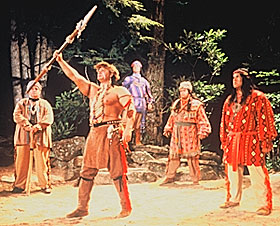
Take two: Stephen Walkingstick (not shown) will assume the lead role of Tsali in Unto These Hills. Walkingstick’s audition earlier this spring was met with a standing ovation.
|
Unto These Hills, you will again generate enviable ticket revenue! Unto These Hills, you will attain new heights of historical accuracy!
Sound strange? To James Bradley’s ears, so did the misplaced pronouns that have long afflicted the outdoor historical drama. Since Kermit Hunter wrote the script in 1949, male Cherokee characters have spoken of themselves only in the inexplicably highfalutin third person.
But this year, thanks to a tweaking of the script, “he” is out, and “me” is in.
“It’s much more dramatic,” says Bradley, vice chair of the Cherokee Historical Association.
The change is one of the first elements of a planned overhaul of the production, whose attendance has slumped steadily for decades. While Bradley blames the empty bleachers on recent mill closings that forced the exodus of faithful fans, a University of Georgia graduate student in 1983 was sufficiently staggered by the rate of decline to write her thesis on the topic. Bradley hopes a reinvigorated show will lure tourists in a market that, in the last half-century, has become saturated with diversions.
“It used to be we were the only thing going on,” Bradley says. “Now you have Pigeon Forge and Asheville, and people are doing other things. We got a little bit lost.”
A committee of tribal and tourism leaders created Unto These Hills and the adjoining Oconaluftee Indian Village to capitalize on the swarm of visitors drawn by the opening of Great Smoky Mountains National Park. Outdoor historical dramas were hot in a patriotic post-World War II U.S., and nowhere more so than in North Carolina, which is credited as the birthplace of the genre.
Outdoor historical drama, with its unique blend of often spectacular violence, outsized emotions, rugged morality and booming-voiced actors, isn’t just theater without a roof. “These are plays that dramatize history on site,” says Scott Parker, director of the Institute of Outdoor Drama at UNC-Chapel Hill.
Parker captures the peculiar mentality of the outdoor epic — which, along with the Broadway musical, represents America’s only original theatrical forms — in an essay on the institute’s Web site: “These audiences are Americans extroverted enough to send men to the moon, and the plays written for them had better meet them on their own ground. These people want to see big problems met, not discussed.”
Unto These Hills tells the story of the Cherokee people from Spanish explorer Hernando DeSoto’s 1540 arrival in the Appalachians to the Trail of Tears in 1838-1839, spotlighting significant leaders along the way. One of those leaders, Tsali, this year will be played by a member of the Eastern Band. Although Cherokees have always been featured in the drama, Bradley says the casting of Stephen Walkingstick is emblematic of the historical association’s renewed commitment to tribal involvement and historical accuracy.
Until last year, the 25 members of the historical association’s supervisory board served lifetime terms. Recent changes to the board’s bylaws whittled down the membership to nine, all of whom are members of the Cherokee tribe.
“Wisdom is a wonderful thing, but you need some new blood,” says Bradley, who once played the iconic role of Eagle Dancer.
Other changes introduced this year include improved costumes and subtly political script changes, such as having Cherokee warriors attack a group of encroaching Spaniards. “It used to be they’d march out and we’d say, ‘Oh, we’re scared,'” Bradley explains.
And for the first time ever, performers will be pinning on body mics before taking the stage, saving dozens of participant throats (and aiding thousands of audience-member ears). More importantly, the new technology will allow directors to consider casting talented Cherokee actors who might have once struggled to send their voices into the far reaches of the amphitheater.
“There has always been an effort to cast Native Americans in Native American roles, but you have to cast the best person for the part,” according to Parker.
Bradley says there was never any doubt that Walkingstick — who, like many members of the Cherokee tribe, has grown up in the production — was the best person to play Tsali this year.
In an audition worthy of an outdoor drama, Walkingstick’s reading brought all the other Tsali hopefuls to their feet for a rousing standing ovation.
The changes to the drama were cautiously trotted out for the community at a dress rehearsal earlier this spring. “All the comments I’ve heard is that it’s an improved show,” says Bradley. “But we have to be really careful not to do a lot of changes all at once.
“It’s a show about us, and we’re very emotionally attached to it.”
[Contributing writer Hanna Miller is based in Asheville.]
The Cherokee Historical Association presents Unto These Hills at the Mountainside Theater (on Hwy. 441 in Cherokee). The show runs through Saturday, Aug. 20, with performances Mondays through Saturdays at 8:30 p.m.; pre-show entertainment starts at 7:45 p.m. Reserved seats are $18. General admission is $16/adults, $8/kids 6-13. Call (866) 554-4557 or visit www.untothesehills.com for more information.



Before you comment
The comments section is here to provide a platform for civil dialogue on the issues we face together as a local community. Xpress is committed to offering this platform for all voices, but when the tone of the discussion gets nasty or strays off topic, we believe many people choose not to participate. Xpress editors are determined to moderate comments to ensure a constructive interchange is maintained. All comments judged not to be in keeping with the spirit of civil discourse will be removed and repeat violators will be banned. See here for our terms of service. Thank you for being part of this effort to promote respectful discussion.